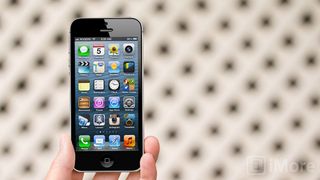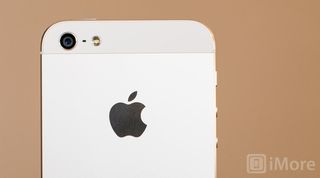iPhone 5 vs. Samsung Galaxy S3: Which phone should you get?

Android is the most popular smartphone platform on the planet, Samsung is the most popular Android manufacturer, and the Galaxy S3 is almost certainly going to be the most popular Android phone this year. And the iPhone 5 is going to be one of the most popular phones, period. So, that means anyone looking to buy a new phone for the next year will likely end up trying to decide between the Samsung Galaxy S3 and Apple's iPhone 5. The good news is, both are phenomenal devices. The bad news is, that makes the choice especially tough. Our Mobile Nations sibling site, Android Central has already given you their take. Here's mine.
iPhone 5 vs. Galaxy S3: Hardware

I'm not wild about Samsung hardware. I'll state that bias right up front. When it comes to Android, I far prefer the build and material quality of HTC to Samsung. Likewise the LCD to SAMOLED PenTile display. That said, Samsung has been improving year after year, generation after generation. It's still not at the level of HTC, much less Apple or Nokia, but it's better. Apple's fit and finish is still out of this world. At roughly 20% thinner and lighter than the iPhone 4S, the iPhone 5's glass and aluminum monolith, from design to construction, simply outclasses Samsung's plastic river stone.
Build aside, however, Samsung continues to jam a breathtaking amount of specs into their flagship line. While the Galaxy S3 screen remains PenTile, it's also HUGE. 4.8-inches, 1280x720 huge to be precise. That absolutely dwarf's even the iPhone 5's newly expanded 4-inch, 1136 x 640 screen. The iPhone 5's IPS in-cell display looks better and at 326 ppi than the Galaxy S3's 306 ppi, and is insignificantly sharper, but overall size does matter. Unless you really want a screen you can use one handed, or you have tiny hipster jean pockets, or you really care about pixel-perfect graphics, Samsung's bigger is bigger. (You might even be able to skip a Nexus 7 if you buy a Galaxy S3 -- it's seriously, luxuriously, big.)
When it comes to performance, it's difficult to compare Apples to Samsungs. The iPhone 5 has the brand new Apple A6 processor, which they simply cite as being twice as fast as last year's Apple A5. Apple has a huge advantage in that they tailor make their own unique software for their own exactly matched hardware. Body and soul in one device. Samsung has to fit Google's generic software to their specific hardware. Hand at the wheel. The Apple A6 is Apple's first custom chipset with a dual-core ARM v7s based processor and triple-core PowerVR graphics chip. That's a big deal. To geeks. For everyone else, Samsung's 1.4GHz Exynos quad-core monster will likely be every bit as impressive. Tie.
Apple has a higher built-in storage option, at 64GB to Samsung's 32GB, but Samsung lets you put in up to 64GB of extra, micro SDHC storage. There are some cons to removable media, but not enough to stop me from giving Samsung the edge there.
Both the iPhone 5 and the Samsung Galaxy S3 have aGPS and GLONASS. Both go up to 802.11n Wi-Fi at 5GHz and Bluetooth 4.0. Both can support ultra-fast 4G LTE. Apple can't do simultaneous voice and data over LTE, so if you're on AT&T/GSM, you'll drop down to still fast DC-HSPA+. If you're on Verizon or Sprint, however, you'll be offline (unless you're on Wi-Fi), just like the pre-LTE days. If you use a lot of simultaneous voice and data on Verizon or Sprint now, like looking things up on the web while talking on the phone, Samsung has the advantage. The Galaxy S3 also has NFC, which is a checkbox in its favor to be sure, but only if you frequently have a mobile payment system, check in system, or other NFC-enabled Android devices to work with. Still, winning.
Samsung had a dud of a camera in the Galaxy Nexus, but made everything right in the Android world again with the glass in the Galaxy S3. It's 8 megapixel, f2.6 shooter looked almost, if not exactly as good as the iPhone 4S' 8 megapixel, f2.4 lens. We'll have to wait and see what, if any, pure photon enhancements the iPhone 5 camera offers over the 4S before we can decide this one, but once you factor in software and apps, it'll almost certainly be too close for any mainstream shopper to call.
Master your iPhone in minutes
iMore offers spot-on advice and guidance from our team of experts, with decades of Apple device experience to lean on. Learn more with iMore!
So when it comes to hardware, the story is pretty much what it always is with Apple and Samsung: Apple wins on design, manufacturing, and elegance, and Samsung wins on size, power, and quantity of specs.
iPhone 5 vs. Galaxy S3: Software

iOS vs. Android is almost a cliche at this point. To take just one example, Apple's personal digital assistant, Siri, has a funner, better personality, and is tied into some helpful apps and services, but Google Now is being more aggressive when it comes to context awareness and predictive behavior than Apple. Siri will do what you tell it. Google Now will try to figure out what to do before you tell it.
But here's the thing -- the Galaxy S3 didn't ship with Google Now because it was released before Android 4.1 Jelly Bean hit the market, and Samsung included their own S Voice instead. When Apple releases a new OS, every compatible iPhone gets it the same day. When Google releases a new OS, it can take weeks, months, or an eternity for you to get it, depending on the manufacturer and the carrier. Buy an iPhone 5 with iOS 6 this week, and you'll get iOS 7 day and date next year. Buy a Galaxy S3 this week and it's even odds when, if ever, you'll get next year's version of Android. That may not matter to you -- your phone will keep working the same then as it does now.
If you like the idea of consistent, dependable software updates, Apple has the edge over Samsung. (As do Android Nexus devices with "pure Google" experiences like the Galaxy Nexus.)
Apple is also leading the charge on accessibility features for users with special needs. You don't need to be able to see or hear, for example, to get considerable value from an iPhone. Aside from that, both Apple's Safari and Google Browser/Chrome will get you to your web pages. Both the iPhone 5 and the Galaxy S3 have email programs so you can get your messages. Both have a myriad ways to listen to music, watch videos, and do everything else you'd expect a modern mobile computing platform to do. iOS 6 on the iPhone 5, however, is one thing. The software on the Galaxy S3 is two. It's Android 4.0 Ice Creme Sandwich on its way to Android 4.1 Jelly Bean at the core, but the frosting is all Samsung's own TouchWiz interface. For some people, that's an easier, friendlier blessing that enhances the Android experience. For others, it's a blight they dearly wished Samsung would spare them by simply going stock.
The thing about most Android phones, however, is that you can customize and change it far, far beyond what Apple allows with iOS. Sure you can almost always root Android and jailbreak iOS, but you can do more, and more easily, with the Galaxy S3 than you'll be able to do with the iPhone 5, and for a while still. That includes everything from widgets for easy, glanceable information, to different keyboards to adjust your typing experience.
So software is a similar story to hardware. Apple writes better code and creates more cohesive, consistent user experiences than Google. But Google makes code that does more things and is more customizable than Apple. Argue that all you want, but at the end of the day iOS in invariably smoother, more intuitive, more up-to-date, and more pixel perfect than Android, yet just as invariably misses out on a lot of features Android gets early and gets stock. If you want something that's accessible and just works, iOS has the advantage. If you want something configurable that just works the way you want it to, Android wins.
iPhone 5 vs. Galaxy S3: Services

When it comes to services that bring the internet fully to your phone, Apple has iCloud, which includes iTunes in the Cloud, iTunes Match, Photo Stream, Documents in the Cloud, Find my iPhone, Find my Friends, and more. As a service goes, it's... serviceable. It backs up and syncs your data and gives you access to all of the your iTunes content. But Apple is still new to the cloud and they aren't as strong at it as they are hardware and software. At least not yet.
Google was born in the cloud. They're the biggest cloud services provider in the world. Android, in many ways, is a localized front end for Google's cloud. Now the localized part traditionally wasn't as good as Apple -- they just chucked web pages inside of apps -- but Google has been getting better code as well. Now their services not only work well, but look good and perform far better than ever before.
The twist here is that you can get almost every single Google service on the iPhone 5 that you can get on the Galaxy S3. Now, Android has by far -- by far! -- the better Google integration of course, but the iPhone has a surprising amount as well. From Gmail to Google+ to YouTube to Voice Search to Drive, Google has a full, robust, and increasingly good set of offerings available in Apple's App Store. (For reasons that involve the difference in business models between Apple and Google.) Samsung does add some of their own services on the Galaxy S3, for example S Voice (their version of Apple's Siri), but they tend not to be as good as Google's.
So, going with the Galaxy S3, you get almost the best Google can offer (tainted only slightly by Samsung), but nothing from Apple. Going with the iPhone 5, you get everything Apple and almost everything Google, so I'm tempted to make this category close to a tie. But there's one more kind of service -- customer service.
The Apple Store is unmatched. From buying your iPhone 5, to being taught how to use it, to easily getting help with it when something goes wrong, Apple has hundreds of stores in dozens of countries. If you live anywhere near an Apple Store and your iPhone 5 stops working, you can go in and get it fixed, or get it swapped out for a replacement, in a matter of hours. With the Galaxy S3, all you'll have is lost time and patience as you wait for 3rd parties or the postal system.
Thanks to the Apple Store and iCloud, I've literally walked in with a damaged iPhone and walked out with a new phone with all my data and content wirelessly synced back to it in less than an hour. In that regard, no one yet comes close to Apple and the iPhone.
iPhone 5 vs. Galaxy S3: Content

Apple has a tremendous advantage when it comes to content. iTunes started earlier and is now in more countries and provides more content than anyone else on the planet. Moreover, like with the services above, even if you don't like iTunes books, movies, TV shows, etc., you can also get Amazon, Netflix, Spotify, and all the other content companies right on your iPhone.
Google provides a lot of its own content now with Google Play, and Samsung fills in a lot with Samsung Hub, and you have access to enough third party content that there's no real difference. If you live in the U.S., you're almost certainly good to go. If you live outside the U.S. it can literally be the difference between being able to get legitimate content onto your phone and not (if that matters to you).
When it comes to apps Apple used to win by default based on the sheer magnitude of numbers. That's still true for tablets, but not for phones. The Google Play Store has hundreds of thousands of apps, just like Apple's App Store, including just about every big name app and game you can think of.
Apple has also become slightly more open over time, and Android apps have become much better looking and better working. You can still knock Apple for being more controlling, both in terms of what apps you can get and how those apps can interact with each other (or not), but for some users the simplicity and security of that model trumps any neck-bearded annoyance.
Now, if you already have an iPhone or iPod touch or iPad, and a lot of iOS apps that work on the iPhone, or if you've already bought a lot of iTunes media, that can make it easier and cheaper to stick with Apple. Likewise, if you already have a lot of content from Google Play, you'll find it easier to stick with Android.
Otherwise, if you're in the U.S., you're good to go with either, and if you're outside the U.S. and really care about buying your media, check and see what's available, but Apple and the iPhone 5 is your safer bet.
iPhone 5 vs. Galaxy S3: Bottom line

Like I said at the beginning, we're well past the days of obvious and easy disparities in devices. Things are more balanced and more nuanced now. And that's a very good thing for consumers. Apple's iPhone 5 and Samsung's Galaxy S 3 are both among the very best phones ever made and you'll be well served by either one.
Samsung offers things that the iPhone 5 just doesn't provide, including a much larger screen, NFC, widgets, and other customizations, DLNA support, etc., Those are important differences, make no mistake, so weigh them carefully. The Galaxy S3 is an absolute beast. If any of those things matter to you, or you just plain prefer Google and Samsung to Apple, get the Galaxy S3.
Otherwise get the sleekest, slimmest, easiest to use, most mainstream friendly, most content rich, most well supported phone in the industry -- the iPhone 5.
- iPhone 5: Everything you need to know
- Galaxy S3: Everything you need to know

Rene Ritchie is one of the most respected Apple analysts in the business, reaching a combined audience of over 40 million readers a month. His YouTube channel, Vector, has over 90 thousand subscribers and 14 million views and his podcasts, including Debug, have been downloaded over 20 million times. He also regularly co-hosts MacBreak Weekly for the TWiT network and co-hosted CES Live! and Talk Mobile. Based in Montreal, Rene is a former director of product marketing, web developer, and graphic designer. He's authored several books and appeared on numerous television and radio segments to discuss Apple and the technology industry. When not working, he likes to cook, grapple, and spend time with his friends and family.

All-screen iPhone SE 4 tipped for a 2025 launch, but those hoping for a low-budget powerhouse are set to be disappointed

Apple's iPhone 16 could finally get the capacitive buttons that the iPhone 15 missed out on with a supplier now lined up

An Apple Vision Pro headset helped this Brazilian surgeon repair an injured shoulder like never before
Most Popular


